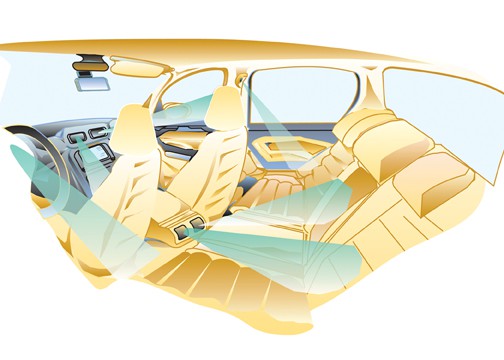Know Your Car’s Air Conditioning System
When your car’s air conditioning fails, it can be more than a nuisance—it can become a health and safety matter.
Most of us first notice an air conditioning problem when the car gets hot and muggy. But those with allergies can be quickly exposed to irritants when the windows are rolled down. A cool passenger cabin has also been cited as a factor in keeping the driver alert.
Beyond just cooling the car, the vehicle’s air conditioning system is also necessary for defogging the inside of the windows. Without it, the occupants are at risk in bad weather.
The air conditioning system can give many hints that something isn’t right. Unusual noises, poor air flow or blowing hot air instead of cold are all signs of a problem. Each problem could have different causes, perhaps a broken belt, a component failure, an electrical problem, or loss of the pressurized refrigerant.
It’s always best to take your car to a professional service provider who offers full system service and uses the proper tools to find the problem.
If refrigerant is leaking, simply adding more won’t fix it! Refrigerant will continue to escape and the loss may cause other expensive damage as well. Why risk it?
Additionally, today’s refrigerant (R-134a) is a potent greenhouse gas regulated by the U.S. EPA. Professional service shops are required to recover and recycle the chemical, and it is illegal for anyone to release it into the atmosphere.
The best refrigerant for any car is the one initially installed. It’s important to know that since 1995, no automaker has approved any refrigerant other than R-134a for use in their vehicles A/C systems.
Newer cars and trucks use even less refrigerant in newer, more-efficient systems. These systems require a precise amount of refrigerant and won’t tolerate mistakes during service.
Too little gas in these systems will cause poor cooling and put other, expensive components at risk because there is not enough lubricant circulating. A more common error—overcharging—puts too much refrigerant into the system and risks damage from much higher internal pressures.
The days of just “topping off” a system are gone, and professional repair shops have the tools and the knowledge to diagnose, repair and recharge a failed system.
To learn more about your vehicle’s air conditioning system, visit the Mobile Air Conditioning Society (MACS) Worldwide website at www.macsw.org and www.epa.gov/ozone/title6/609
e-mail macsworldwide@macsw.org


Leave a Reply